BMW X3 vs Toyota Yaris Cross – Differences & prices compared
Compare performance, boot space, consumption and price in one view.
Find out now: which car is the better choice for you – BMW X3 or Toyota Yaris Cross?
The BMW X3 (SUV) comes with a Petrol MHEV, Diesel MHEV or Plugin Hybrid engine and Automatic transmission. In comparison, the Toyota Yaris Cross (SUV) features a Full Hybrid engine with Automatic transmission.
When it comes to boot capacity, the BMW X3 offers 570 L, while the Toyota Yaris Cross provides 397 L – depending on how much space you need. If you’re looking for more power, decide whether the 398 HP of the BMW X3 or the 130 HP of the Toyota Yaris Cross suits your needs better.
In terms of consumption, the values are 2.80 L per 100 km for the BMW X3, and 4.50 L for the Toyota Yaris Cross.
Price-wise, the BMW X3 starts at 50900 £, while the Toyota Yaris Cross is available from 23700 £. Compare all the details and find out which model fits your lifestyle best!
BMW X3
The BMW X3 stands out in the competitive SUV market with its refined blend of performance and luxury. Its interior boasts high-quality materials and a design focused on driver comfort and convenience. With a robust engine lineup, the vehicle offers a balanced driving experience that caters to both urban settings and off-road adventures.
details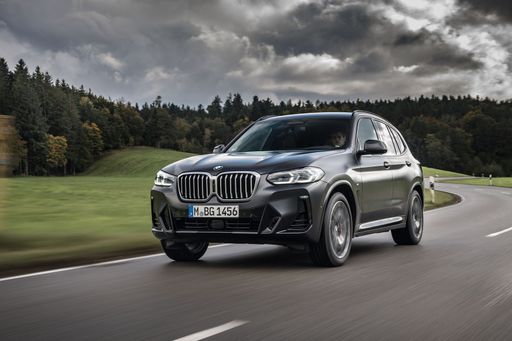 @ press.bmwgroup.com
@ press.bmwgroup.com
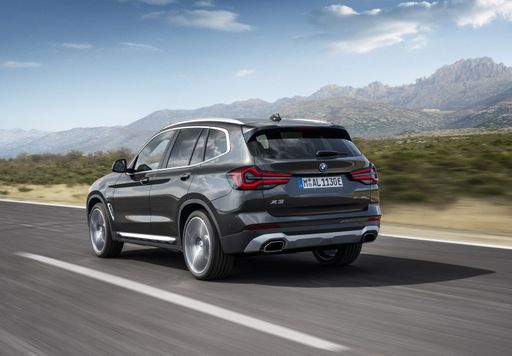 @ press.bmwgroup.com
@ press.bmwgroup.com
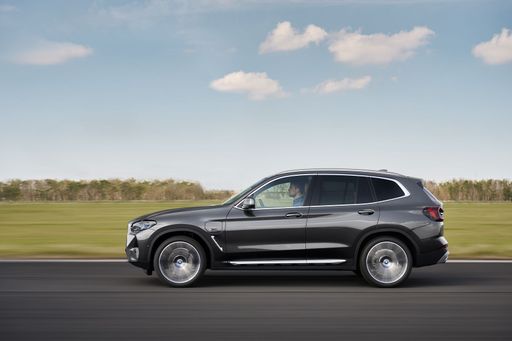 @ press.bmwgroup.com
@ press.bmwgroup.com
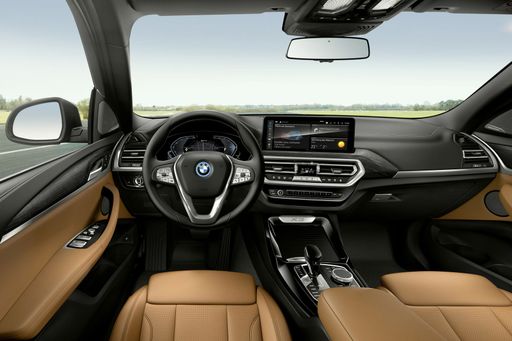 @ press.bmwgroup.com
@ press.bmwgroup.com
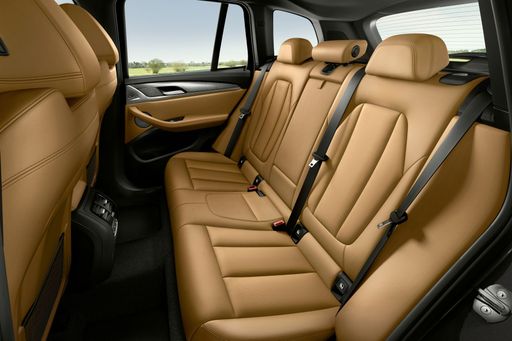 @ press.bmwgroup.com
@ press.bmwgroup.com
Toyota Yaris Cross
The Toyota Yaris Cross combines the practicality of a compact SUV with the agility of a smaller car, making it ideal for urban adventures. Its elevated seating position offers excellent visibility, while the stylish design ensures it stands out on the city streets. Inside, the Yaris Cross boasts a modern interior with advanced technology features designed to enhance the driving experience.
details @ Toyota
@ Toyota
 @ Toyota
@ Toyota
 @ Toyota
@ Toyota
 @ Toyota
@ Toyota
 @ Toyota
@ Toyota
 @ Toyota
@ Toyota
 @ Toyota
@ Toyota

|

|
|
|
|
Costs and Consumption |
|
|---|---|
|
Price
50900 - 72400 £
|
Price
23700 - 34300 £
|
|
Consumption L/100km
2.8 - 7.7 L
|
Consumption L/100km
4.5 - 4.8 L
|
|
Consumption kWh/100km
-
|
Consumption kWh/100km
-
|
|
Electric Range
88 km
|
Electric Range
-
|
|
Battery Capacity
19.70 kWh
|
Battery Capacity
-
|
|
co2
64 - 175 g/km
|
co2
101 - 108 g/km
|
|
Fuel tank capacity
50 - 65 L
|
Fuel tank capacity
36 L
|
Dimensions and Body |
|
|---|---|
|
Body Type
SUV
|
Body Type
SUV
|
|
Seats
5
|
Seats
5
|
|
Doors
5
|
Doors
5
|
|
Curb weight
1930 - 2140 kg
|
Curb weight
1180 - 1290 kg
|
|
Trunk capacity
460 - 570 L
|
Trunk capacity
320 - 397 L
|
|
Length
4755 mm
|
Length
4180 mm
|
|
Width
1920 mm
|
Width
1765 mm
|
|
Height
1660 mm
|
Height
1595 mm
|
|
Payload
570 kg
|
Payload
485 - 510 kg
|
Engine and Performance |
|
|---|---|
|
Engine Type
Petrol MHEV, Diesel MHEV, Plugin Hybrid
|
Engine Type
Full Hybrid
|
|
Transmission
Automatic
|
Transmission
Automatic
|
|
Transmission Detail
Automatic Gearbox
|
Transmission Detail
-
|
|
Drive Type
All-Wheel Drive
|
Drive Type
Front-Wheel Drive
|
|
Power HP
197 - 398 HP
|
Power HP
116 - 130 HP
|
|
Acceleration 0-100km/h
4.6 - 7.8 s
|
Acceleration 0-100km/h
10.7 - 11.3 s
|
|
Max Speed
215 - 250 km/h
|
Max Speed
170 km/h
|
|
Torque
330 - 670 Nm
|
Torque
-
|
|
Number of Cylinders
4 - 6
|
Number of Cylinders
3
|
|
Power kW
145 - 293 kW
|
Power kW
85 - 96 kW
|
|
Engine capacity
1995 - 2998 cm3
|
Engine capacity
1490 cm3
|
General |
|
|---|---|
|
Model Year
2024 - 2025
|
Model Year
2024 - 2025
|
|
CO2 Efficiency Class
F, E, B
|
CO2 Efficiency Class
C
|
|
Brand
BMW
|
Brand
Toyota
|
BMW X3
Introducing the BMW X3: A Blend of Power and Innovation
The BMW X3 is a testament to the brand’s commitment to merging luxury with cutting-edge technology. This SUV not only offers impressive on-road performance but also showcases innovative features that cater to both petrolheads and eco-conscious drivers.
Powerful Performance Across the Range
The BMW X3 comes with various powertrain options to suit diverse driving preferences, ranging from efficient plug-in hybrids to powerful petrol and diesel mild-hybrids. With performance outputs ranging from 184 PS to an impressive 510 PS, the X3 proves its versatility on the road. Paired with BMW's renowned automatic transmission, each model offers a smooth and responsive driving experience complemented by the brand's xDrive all-wheel-drive system.
Leading-Edge Hybrid Technology
Among the X3's portfolio, the plug-in hybrid variants stand out with their optimal balance between efficiency and performance. These models boast electric-only ranges up to 90 km, ideal for urban driving with minimal emissions. Meanwhile, the mild-hybrid systems enhance efficiency by recuperating energy during deceleration and supporting the combustion engine, optimizing fuel consumption ranging from 0.9 L/100km to 10.8 L/100km depending on the model.
Contemporary Design with Practical Features
From a design perspective, the BMW X3 maintains its iconic SUV silhouette, characterized by robust proportions and sleek, aerodynamic lines. With dimensions of up to 4755 mm in length and a luggage capacity of up to 570 litres, it caters to both style enthusiasts and practical users. Additionally, the interior showcases BMW’s commitment to sophistication, featuring high-quality materials, state-of-the-art infotainment systems, and comprehensive driver-assistance technologies.
Efficiency Meets Performance
The X3's impressive performance figures are complemented by its responsible approach to CO2 emissions, aligning with EU efficiency standards. Enhanced by its comprehensive suite of driver aids and intelligent safety features, the X3 ensures both the thrill of driving and peace of mind.
Conclusion: The Ultimate Driving Companion
In essence, the BMW X3 represents the perfect intersection of dynamic performance, fuel efficiency, and modern-day technology. With options catering to diverse needs and preferences, it remains a leading choice for drivers seeking versatility, innovation, and luxury.
Toyota Yaris Cross
Discovering the Toyota Yaris Cross: The Compact SUV Redefined
The Toyota Yaris Cross has boldly entered the compact SUV market, sporting a blend of sleek aesthetics, advanced hybrid technology, and practical functionality. As urban driving dynamics evolve, this vehicle meets the demands of modern motorists with an impressive performance and eco-friendly technology, setting itself apart in a bustling segment.
Performance and Efficiency: Hybrid Innovation at Its Best
The Yaris Cross is designed to provide an engaging driving experience combined with remarkable efficiency. At its heart lies a full hybrid powertrain, offering options between 116 PS and 130 PS, efficiently paired with Toyota's CVT automatic transmission. The hybrid system seamlessly integrates a petrol engine with an electric motor, optimising power delivery and responsiveness.
Drivers will appreciate the low fuel consumption, which ranges from 4.5 to 4.8 litres per 100 km, and equally impressive CO2 emissions of 101 to 108 g/km, aligning with the industry's ongoing commitment to sustainability.
Design and Dimensions: Compact Yet Spacious
The Yaris Cross offers a perfect blend of compact design and interior spaciousness, making it an ideal choice for urban environments. Measuring 4,180 mm in length, 1,765 mm in width, and 1,595 mm in height, the vehicle manages to provide a refined SUV stature without sacrificing manoeuvrability.
Its five-door layout and flexible boot space, ranging from 320 to 397 litres, make it practical for everything from city commutes to weekend getaways. The increased ride height adds to the SUV appeal, providing drivers with that coveted higher driving position and improved visibility.
Advanced Technology and Features
The Toyota Yaris Cross is well-equipped with an array of technological features, defined by its various trim levels including the Business Edition CVT, Comfort CVT, and the sporty GR Sport CVT. Each model is crafted to cater to diverse consumer needs, whether one prioritises enhanced comfort, sporty aesthetics, or comprehensive safety features.
Key innovations include a state-of-the-art infotainment system, advanced driver assistance features, and the Toyota Safety Sense package that enhances driver confidence through adaptive cruise control, lane keep assist, and more.
Driving Experience: Safety and Comfort in Focus
The Yaris Cross is not just about performance but also ensures safety and comfort for all occupants. The vehicle offers a smooth and quiet ride thanks to its refined suspension system and cleverly designed cabin, reducing noise and vibration levels.
The advanced safety suite within the Yaris Cross, encompassing multiple airbags, stability control, and a host of driver assistance systems, is designed to provide protection and peace of mind, every time you step into the driver's seat.
Conclusion: A New Benchmark in the Compact SUV Segment
The Toyota Yaris Cross stands as a testament to Toyota's commitment to producing environmentally friendly vehicles without compromising on performance or style. It strikes a harmonious balance between innovation, efficiency, and practicality, offering consumers a compact SUV that is both exciting to drive and easy to live with.
As we move further into an era of hybrid advancements and smarter automotive solutions, the Yaris Cross embodies these principles exceptionally, proving to be a robust and reliable partner for the modern driver.
The prices and data displayed are estimates based on German list prices and may vary by country. This information is not legally binding.
